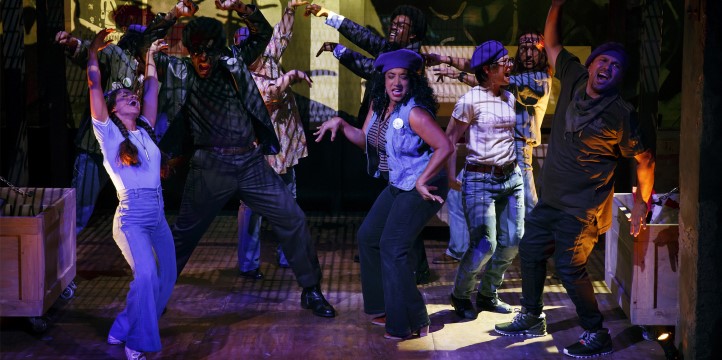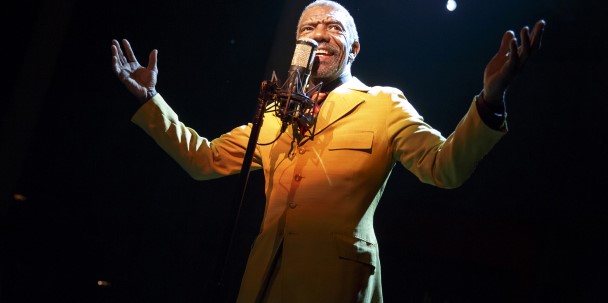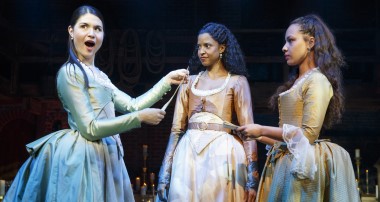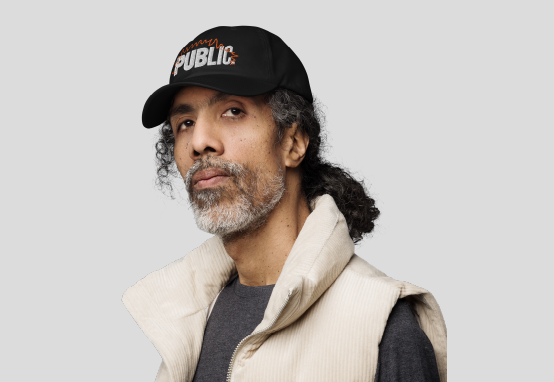A conversation with FAT HAM's playwright James Ijames and director Saheem Ali, and writer J. Gabriel Ware
An old-fashioned backyard party in the American South: karaoke with good food, good drinks, good family fun. What could possibly ruin it? How about avunculicide?
That ominous threat looms over playwright James Ijames’ Pulitzer Prize-winning FAT HAM, a reinvention of Shakespeare’s masterpiece, Hamlet. This new dramedy centers Juicy, a soft-hearted Black college kid who grapples with questions of sexuality and identity when the ghost of his father demands that he avenge his murder.
Directed by The Public Theater’s Associate Artistic Director/Resident Director Saheem Ali and co-produced by The Public and National Black Theatre, FAT HAM made its in-person world premiere at The Public’s Anspacher Theater on May 12 and will run through July 3. The cast includes Nikki Crawford (Tedra), RJ Foster (Understudy Rev/Pap), Tanesha Gary (Understudy Tedra/Rabby), Marquis D. Gibson (Understudy Juicy/Tio/Larry), Chris Herbie Holland (Tio),Billy Eugene Jones (Rev/Pap), Alexandria Lewis (Understudy Opal), Adrianna Mitchell (Opal), Calvin Leon Smith (Larry), Marcel Spears (Juicy), Benja Kay Thomas (Rabby), and Matthew Elijah Webb (Understudy Larry/Tio/Juicy).
Ijames uses the bare bones of Hamlet and the Black family tradition of the backyard barbeque to build an exposé that makes a hilarious mockery out of harmful—and even deadly—concepts such as toxic masculinity and homophobia.
“It's able to be funny because it is ridiculous,” Ijames says. “If you get it in the right light, and under the right circumstances, homophobia is ridiculous. If you get toxic masculinity under the right microscope, it is a foolish sort of self-deprecating, self-denying absurdity.”
Not Quite Hamlet
Ijames fell in love with Hamlet while in college; he gravitated to the characters and the play has stayed with him ever since. However, he says teachers in his graduate training program told him he didn’t fit the Shakespearean mold.
“And I knew it was mostly about the way I spoke, like my diction and all of that nonsense,” Ijames says.
So, he decided to take Hamlet and create a new story that captures the same scale of emotion and stakes, but in a tongue that resembled his own. Ijames, now based in Philadelphia, pulled from his own experiences growing up in Bessemer City, North Carolina.
He says he thought for just a second about responses he may get for tinkering with a Shakespearean classic, before he quickly pushed those worries behind him. Ali, on the other hand, relishes putting new spins on classics. Just last year, he directed Jocelyn Bioh’s Shakespeare in the Park production of Jocelyn Bioh’s Merry Wives, which is set in South Harlem “amidst a vibrant and eclectic community of West African immigrants." Also last year for The Public and WNYC, he directed Ricardo Pérez González’s Romeo y Julieta, a bilingual audio adaptation of the Shakespeare classic that starred Oscar winner Lupita Nyong’o and Drama Desk Award winner Juan Castano. Before that, he directed The Public’s WNYC broadcast of Richard II, which was performed by a predominately BIPOC cast.
“I don't do a classic unless I'm kind of f***ing with it in some way,” Ali says. “Otherwise, I don't want to do it. I never would do it straight—no pun intended.”
Ijames and Ali first worked together a few years ago when Ali directed Ijames’ play Kill Move Paradise at NBT. After Ali became The Public’s Associate Artistic Director/Resident Director, he made it a priority to bring Ijames into the fold. He read FAT HAM and knew they had something special.
“[FAT HAM] actually moved the needle so much further in what I already had been doing in my own work with Shakespeare,” Ali says. “And the way that James [tackles toxic masculinity and homophobia] with his smarts and humor—it's delicious.”
FAT HAM made its world premiere as a digital production at the Wilma Theater in Philadelphia last year and this year won the Pulitzer Prize. Ali says he will wait until The Public’s run is done to watch the digital production because he doesn’t want his own creativity and vision to be influenced by what has already been done.













